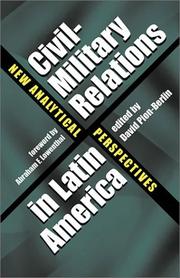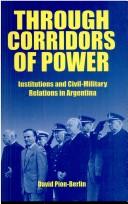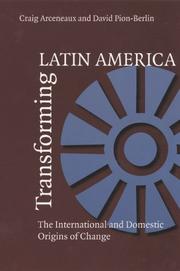| Listing 1 - 10 of 17 | << page >> |
Sort by
|
Book
ISBN: 1137592699 1137592702 Year: 2016 Publisher: New York : Palgrave Macmillan US : Imprint: Palgrave Macmillan,
Abstract | Keywords | Export | Availability | Bookmark
 Loading...
Loading...Choose an application
- Reference Manager
- EndNote
- RefWorks (Direct export to RefWorks)
This book demonstrates through country case studies that, contrary to received wisdom, Latin American militaries can contribute productively, but under select conditions, to non-traditional missions of internal security, disaster relief, and social programs. Latin American soldiers are rarely at war, but have been called upon to perform these missions in both lethal and non-lethal ways. Is this beneficial to their societies or should the armed forces be left in the barracks? As inherently conservative institutions, they are at their best, the author demonstrates, when tasked with missions that draw on pre-existing organizational strengths that can be utilized in appropriate and humane ways. They are at a disadvantage when forced to reinvent themselves. Ultimately, it is governments that must choose whether or not to deploy soldiers, and they should do so, this book argues, based on a pragmatic assessment of the severity and urgency of the problem, the capacity of the military to effectively respond, and the availability of alternative solutions. David Pion-Berlin is a Professor of Political Science at the University of California, Riverside, USA. He is a Latin Americanist whose numerous books and articles have focused on civil-military relations, defense, security, and human rights. .
Public administration. --- Political science. --- Comparative government. --- Political planning. --- Planning in politics --- Public policy --- Comparative political systems --- Comparative politics --- Government, Comparative --- Political systems, Comparative --- Administration --- Civil government --- Commonwealth, The --- Government --- Political theory --- Political thought --- Politics --- Science, Political --- Social sciences --- State, The --- Planning --- Policy sciences --- Politics, Practical --- Public administration --- Political science --- Latin America-Politics and gover. --- Politics and war. --- Development economics. --- Comparative politics. --- Public policy. --- Latin American Politics. --- Military and Defence Studies. --- Development Economics. --- Comparative Politics. --- Public Policy. --- Public Administration. --- Administration, Public --- Delivery of government services --- Government services, Delivery of --- Public management --- Public sector management --- Administrative law --- Decentralization in government --- Local government --- Public officers --- Economics --- Economic development --- War --- War and politics --- Political aspects --- Latin America—Politics and government. --- Latin America --- Latin America. --- Military policy. --- Asociación Latinoamericana de Libre Comercio countries --- Neotropical region --- Neotropics --- New World tropics --- Spanish America

ISBN: 0807875295 9780807875292 0807826561 9780807826560 0807849812 9780807849811 9798890871510 Year: 2001 Publisher: Chapel Hill ; London : The University of North Carolina Press,
Abstract | Keywords | Export | Availability | Bookmark
 Loading...
Loading...Choose an application
- Reference Manager
- EndNote
- RefWorks (Direct export to RefWorks)
In nine essays, this volume offers theoretical insights into the dilemmas facing Latin American politicians as they struggle to gain full control over their military institutions. The contributors use a wide range of contemporary models to analyze political and economic reform.
Civil-military relations --- Democratization --- Democratic consolidation --- Democratic transition --- Political science --- New democracies --- Military and civilian power --- Military-civil relations --- Executive power --- Sociology, Military --- Military government --- Relations pouvoir civil-pouvoir militaire --- Démocratisation
Book
ISBN: 9781685853082 1685853080 Year: 2023 Publisher: Boulder
Abstract | Keywords | Export | Availability | Bookmark
 Loading...
Loading...Choose an application
- Reference Manager
- EndNote
- RefWorks (Direct export to RefWorks)
Departing from conventional wisdom, Pion-Berlin argues that the use of state terror by Latin American regimes often has been the product of intellectual constructs, not a reaction to dissent and violent upheavals by the popular classes or to pressures from the economically powerful classes.
Digital
ISBN: 9781137592705 Year: 2016 Publisher: New York Palgrave Macmillan US :Imprint: Palgrave Macmillan
Abstract | Keywords | Export | Availability | Bookmark
 Loading...
Loading...Choose an application
- Reference Manager
- EndNote
- RefWorks (Direct export to RefWorks)
This book demonstrates through country case studies that, contrary to received wisdom, Latin American militaries can contribute productively, but under select conditions, to non-traditional missions of internal security, disaster relief, and social programs. Latin American soldiers are rarely at war, but have been called upon to perform these missions in both lethal and non-lethal ways. Is this beneficial to their societies or should the armed forces be left in the barracks? As inherently conservative institutions, they are at their best, the author demonstrates, when tasked with missions that draw on pre-existing organizational strengths that can be utilized in appropriate and humane ways. They are at a disadvantage when forced to reinvent themselves. Ultimately, it is governments that must choose whether or not to deploy soldiers, and they should do so, this book argues, based on a pragmatic assessment of the severity and urgency of the problem, the capacity of the military to effectively respond, and the availability of alternative solutions.
Political systems --- International relations. Foreign policy --- Politics --- Economic policy and planning (general) --- Economic conditions. Economic development --- Developing countries: economic development problems --- Polemology --- Public administration --- Military engineering --- politieke wetenschappen --- politiek --- ontwikkelingssamenwerking --- administratie --- defensie --- Latin America

ISBN: 0271017058 0271017066 Year: 1997 Publisher: University Park, Pa. : Pennsylvania State University Press,
Abstract | Keywords | Export | Availability | Bookmark
 Loading...
Loading...Choose an application
- Reference Manager
- EndNote
- RefWorks (Direct export to RefWorks)
Civil-military relations --- Relations pouvoir civil-pouvoir militaire --- Military policy --- Police militaire --- Argentina --- Argentine --- Politics and government --- Politique et gouvernement
Book
ISBN: 1555871607 1685853080 Year: 1989 Publisher: London Rienner
Abstract | Keywords | Export | Availability | Bookmark
 Loading...
Loading...Choose an application
- Reference Manager
- EndNote
- RefWorks (Direct export to RefWorks)
Labor unions --- Political persecution --- Government policy --- Argentina --- Peru --- Economic policy.
Multi
ISBN: 9781685853082 9781555871604 Year: 2023 Publisher: Boulder Lynne Rienner Publishers
Abstract | Keywords | Export | Availability | Bookmark
 Loading...
Loading...Choose an application
- Reference Manager
- EndNote
- RefWorks (Direct export to RefWorks)
Book
ISBN: 1299397166 0739152688 9780739152683 0739127268 9780739127261 Year: 2008 Publisher: Lanham : Lexington Books,
Abstract | Keywords | Export | Availability | Bookmark
 Loading...
Loading...Choose an application
- Reference Manager
- EndNote
- RefWorks (Direct export to RefWorks)
This collection examines Argentina's recent economic and political crisis by looking at the events leading up to the crisis, the reaction by both security forces and the people, and the relations between Argentina and its foreign allies. Finally the book looks to the future, asking how this crisis will affect the nation.
Financial crises --- Argentina --- Economic conditions --- Politics and government --- Since 1983
Book
ISBN: 1108365213 1316576639 1108363652 1107149975 1316604438 Year: 2017 Publisher: Cambridge : Cambridge University Press,
Abstract | Keywords | Export | Availability | Bookmark
 Loading...
Loading...Choose an application
- Reference Manager
- EndNote
- RefWorks (Direct export to RefWorks)
Are interactions between soldiers, politicians, and civilians improving? Every nation has to come to grips with achieving a more enduring harmony between government, the armed forces, and society if it aspires to strengthen its democracy. While there is an abundance of studies on civil-military affairs, few examine all three of these actors, let alone establish any standards with which to assess whether progress is being made. This ambitious book devises a novel framework equipped with six dimensions, each of which opens a unique window into civil-military affairs, and which form a more integrated view of the subject. Those dimensions are accompanied by a set of benchmarks and metrics that assess progress and compare one country against another. The framework is applied to case studies of Argentina, Brazil, Chile, and Uruguay, with the conviction that insights could be gleaned that may be relevant elsewhere. Ultimately, by unpacking the civil-military relation into its various dimensions, this study has shed light on what it takes to transform what was once a politically-minded military into an organization dedicated to serving a democratic state and society.
Civil-military relations --- Democracy --- Self-government --- Political science --- Equality --- Representative government and representation --- Republics --- Military and civilian power --- Military-civil relations --- Executive power --- Sociology, Military --- Military government --- Southern Cone of South America --- Brazil --- al-Barāzīl --- Barāzīl --- Brasil --- Brasile --- Brasilia --- Brasilië --- Brasilien --- Brazili --- Brazili Federativlă Respubliki --- Brazilia --- Brazilië --- Brazilii︠a︡ --- Brazilii︠a︡ Federativ Respublikaḣy --- Braziliya --- Braziliya Federativ Respublikası --- Brazilská federativní republika --- Brazylia --- Brésil --- Burajiru --- Federale Republiek van Brasilië --- Federative Republic of Brazil --- Federativna republika Brazil --- Federativna republika Brazilii︠a︡ --- Federat︠s︡iėm Respublikė Brazil --- Fedėratyŭnai︠a︡ Rėspublika Brazilii︠a︡ --- Gweriniaeth Ffederal Brasil --- Pa-hsi --- Pa-se --- Pa-se Liân-pang Kiōng-hô-kok --- Pederatibong Republika sa Brasil --- Pindorama --- República Federal del Brasil --- Republica Federale di u Brasile --- Republica Federativa del Brazil --- República Federativa do Brasil --- Rèpublica fèdèrativa du Brèsil --- Republik Kevreel Brazil --- République fédérative du Brésil --- Tantasqa Republika Wrasil --- Tetã Pindorama --- Wrasil --- Федэратыўная Рэспубліка Бразілія --- Федеративна република Бразилия --- Федерациэм Республикэ Бразил --- Бразил --- Бразили --- Бразили Федеративлă Республики --- Бразилия --- Бразилия Федератив Республикаhы --- Бразілія --- البرازيل --- برازيل --- ブラジル --- Cone Sul (South America) --- Cono Sur (South America) --- Cono Sur de América --- South America, Southern --- South America, Southern Cone of --- South American Southern Cone --- Southern Cone (South America) --- Southern South America --- Armed Forces --- Political activity. --- Politics and government

ISBN: 0822958821 1322068607 0822972808 9780822972808 9780822958826 Year: 2005 Publisher: Pittsburgh : University of Pittsburgh Press,
Abstract | Keywords | Export | Availability | Bookmark
 Loading...
Loading...Choose an application
- Reference Manager
- EndNote
- RefWorks (Direct export to RefWorks)
"Looking broadly across the Western Hemisphere, with examples from Brazil, the Southern Cone, the Andes, and Central America, Arceneaux and Pion-Berlin identify general rules that explain how international and domestic politics interact in specific contexts. The detailed, accessible case studies cast new light on such central problems as neoliberal economic reform, democratization, human rights, regional security, environmental degradation, drug trafficking, and immigration." "This ambitious book offers a clear and unified framework for understanding political change across Latin America. The impact of U.S. hegemony and the global economic system on the region is widely known, and scholars and advocates alike point to Latin America's vulnerability in the face of external forces. In spite of such foreign pressure, however, individual countries continue to chart their own courses, displaying considerable variation in political and economic life."
Democratization --- Social change --- Démocratisation --- Changement social --- Latin America --- Amérique latine --- Politics and government. --- Foreign relations. --- Politique et gouvernement --- Relations extérieures
| Listing 1 - 10 of 17 | << page >> |
Sort by
|

 Search
Search Feedback
Feedback About UniCat
About UniCat  Help
Help News
News